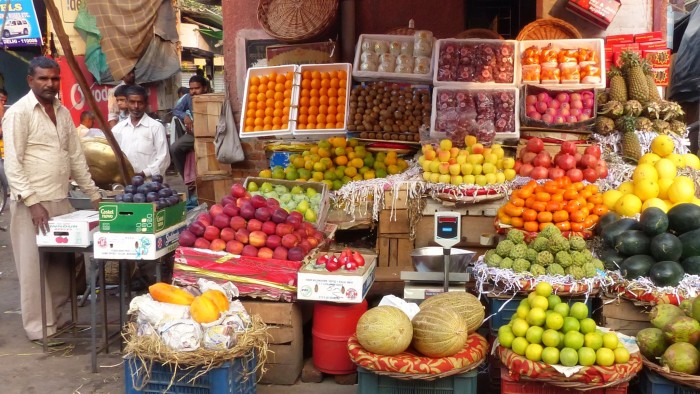The winter of culinary content


Simply sign up to the Life & Arts myFT Digest -- delivered directly to your inbox.
It doesn’t feel like winter without a visit to Old Delhi’s crowded lanes, one of my favourite parts of the city. There are two reasons to take the Metro down to Chandni Chowk: gluttony, and something else, a quest that goes a little beyond greed.
The gluttony is easily justified. Most of the world’s great cities have great local markets. With the morning’s loot safely stashed in my backpack — mutton korma masala; rose petal chikki, a kind of nut brittle; tin boxes of halwa, a rich winter dessert — I walk away from the markets into the mesh of connected colonies, hoping to conduct a kind of culinary eavesdropping.
This time of the year marks the festive season in many cultures. There are harvest rituals and thanksgiving rituals, festivals of lights and festivals that celebrate the defeat of the world’s assorted demons, feasts that stand as reminders of how lucky a family might be, to have plenty on the table, and enough to see them through winter.
Along with the riches of festival food found in specialty restaurants or served in temples, gurdwaras and mosques in community feasts, what I love most about this season is the tradition of slow, seasonal home-cooking. This is what I’m eavesdropping on, getting a sense of the pickles and vegetables sun-drying on old wooden balconies, women shaping sugary shakkarparas or sesame-studded gajak by hand.
A close friend grew up in Old Delhi, his family moving out to set up a working farm in Mehrauli some decades ago. His mother used to lament the easy, round-the-year availability of sweets and pickles. It cut people off from eating seasonally, she said, if everything could be savoured at any time of the year, and it was an unhealthy departure from an era when you could gorge without guilt on rich food and sweetmeats at festivals because you didn’t have access to them throughout the rest of the year. I love going out to eat but celebrating a festival around the family table with home-cooked food brings, family quarrels excepted, a different level of satisfaction. Perhaps the cracks in families are as necessary and as unavoidable as chipped crockery; perhaps the sharing of meals, even when we grumble over the ritual, even in families where it is a rare thing, or a cold, formal occasion, holds out the possibility of some peace, either in the future or the past. I could watch Ang Lee’s Eat Drink Man Woman over and over again, the family meeting and struggling to talk, to declare their differences, over Mr Chu’s beautiful food, his daughters grumbling about the torture of Sunday dinners but gathering together anyway. Mr Chu knows that the best fish must be steamed, not roasted, never salted so that its flesh doesn’t dry out, his sure artistry in the kitchen balanced by his stumbling awkwardness as a father.
I love cooking for family and close friends, but succumb to anxiety if I’m cooking for people I don’t know well, and I admire confident hosts. Isabel Allende meant what she said when she wrote of the need to choose menus with care, mindful of the sensuous side of food; Ismail Merchant used to lure actors into saying yes to his films by cooking seductive meals for them. Ruth Reichl writes in her memoirs of Danny Kaye’s dinners, where his pleasure in gathering his friends around his table was sometimes marred by the fact that you can either do the conversation or the fresh lemon pasta justice, rarely both. I’ve been partial to the Thirukkural, a classic of Tamil Sangam literature, ever since I read the chapter on hospitality. “The delicate anicham flower withers when merely smelled/ But an unwelcome look is enough to wither the heart of a guest,” a famous kural or couplet says, adding that the host who cares well for his guests will himself be a welcome guest of the gods. Some of my friends in Delhi live by this philosophy, and many still carry on the tradition of making their own namkeen — salted snacks — or their own halwas and other sweetmeats for the season, rather than ordering these from a shop.
Many years ago, our family realised that we’d been accepted into the inner sanctum of friendship by a large, hospitable Delhi Punjabi clan, when they felt comfortable enough to offer us true ghar ka khana, home food. This included watery vegetable dishes usually considered too humble to serve to “outsiders”. I felt a moment’s pang for the rich, tomato-heavy, farm-butter laden curries considered appropriate guest fare, but eating snake gourd (not a favourite vegetable) was a small price to pay for truly feeling at home. If you come to a city or a country from elsewhere, it is small kindnesses like these that take you across the threshold from feeling like a temporary visitor to being a native of this place.
At home, I sort out our plans for Diwali, one of North India’s biggest festivals. We could join friends at a fancy restaurant for an epic feast. Or we could join older friends and family around their ancient sheesham table with the rickety leg, and put Noori’s masalas to use. I start to look up mutton korma recipes, with Joy Harjo’s poetry running through my mind: “The world begins at a kitchen table. No matter what, we must eat to live.”
Nilanjana Roy is the author of ‘The Wildings’ and ‘The Hundred Names of Darkness’ and lives in Delhi. @nilanjanaroy
Comments